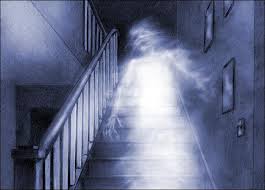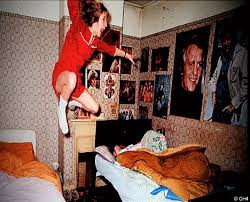What Are Poltergeists?
Poltergeist comes from German and means “Noisy ghost”. In general folklore “Poltergeists” as we now know it was simply known as troublesome, sometimes violent spirits that seemed to haunt people rather than places.
They are a universal phenomenon, sighted all over the world, in Western Europe, in Asia, in Australia, in North America, and at all different periods of history. Oftentimes times they may simply make noises, other times they may cause havoc with households.
There are many purported true stories of poltergeists making life a living hell for house occupants.
But what causes these strange “spirits”?
Possible Causes

-
- Illusion, wishful thinking, and distorted memories on the part of the viewer.
- Ball lightning according to one chemical physicist. Somehow the energy for this type of lightening causes objects to move. The movement of objects by unseen forces is often characteristic of poltergeist sightings.
- Geological or some underground forces including subterranean rivers and even slight house movements and climate change, were the cause, according to famed psychic investigator Guy Lambert.
- An interaction between electrical items, a person’s brain physiology (possibly with telekinetic or object moving capacity), and certain geomagnetic fields or seismic activity are proposed by Michael Persinger.
- Relating to clause 4) many modern-day psychologists and paranormal researchers believe that power comes from within a disturbed individual. That is the Poltergeist is caused and generated by one of the people viewing it. This explanation is relied upon strongly in the famous Hollywood movie series on Poltergeists in the 1980s and the 2000’s more graphically violent equivalent, Paranormal I-VII.
True Life Cases
It is worth exploring this possible cause more since in true-life cases such as Janet in a true-life Poltergeist haunting in England, the activity only occurred for some time. Janet Hodgson’s case known as the Enfield case (See https://dailym.ai/1iiAUHw) in the period 1977-78, a period in which she and her siblings along with her mother had just separated from their father.
In her case, a grumpy old man in the form of a Poltergeist somehow channeled his discomfort through Janet! Is it possible that extreme emotional disturbance in a person’s mind can indeed somehow make them more capable of additional sensory powers such as telekinesis (moving things), making objects appear out of nowhere, and generally causing mischief in a household?
Shown below: Actual shot of Janet levitating during period of poltergeist activity, Enfield, England, 1977
Sometimes it is thought that these types of ghosts have “unresolved issues” or have not appropriately passed into the afterworld! In other words, they have to temporarily come back into our world. Then obtain closure in this world before finally returning permanently to the afterworld. This is depicted in many other Hollywood movies where the Poltergeist comes into the modern-day world. And causes considerable mischief before being assisted by well-meaning teenagers or children, who somehow have an innate understanding of lost ghosts!
Hysteria
6. Paranormal writer Nando Fodor and paranormal experts link Poltergeist activity to hysteria in teenage women, as they enter puberty. However, this does not explain their presence when there are no children whatsoever.
7. Another natural cause said to possibly cause poltergeists is an unusually sudden gust of air. In the case of many parts of the world, these can suddenly pick up. Well-known Poltergeist skeptic Milbourne Christopher cites a 1957 case in Cape Cod. A sudden gust of wind coming down the chimney blew a mirror off the wall. It overturned chairs and blew things off shelves.
Perhaps some of the causes of Poltergeist sightings are natural, some slightly unusual such as the geological and subterranean influences. Some are unknown to occupants of houses. And, then there are the more bizarre such as the theory that the paranormal disturbance. The cause for this is none other than one of the observers of events, often a child or teenage girl.
 Sun Signs Everything Under The Sun!
Sun Signs Everything Under The Sun!
